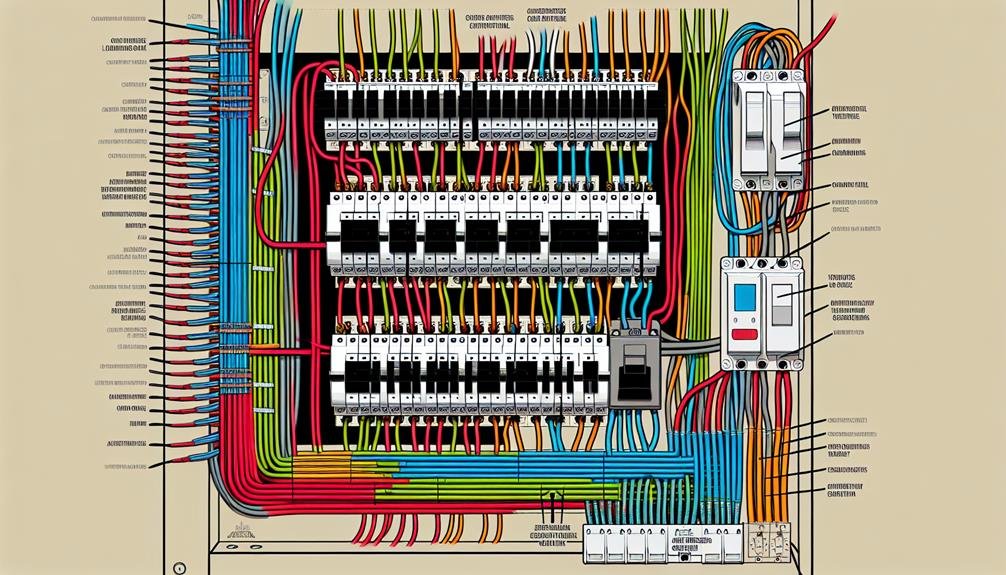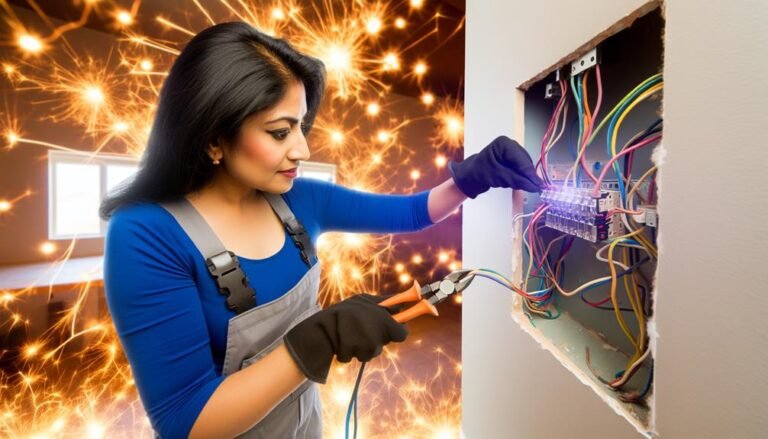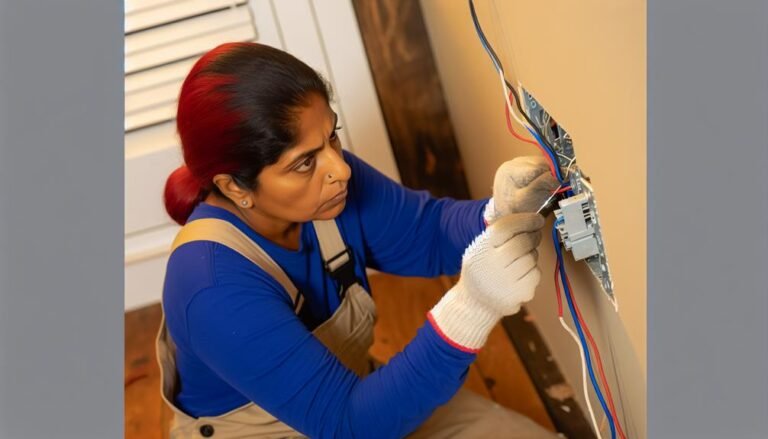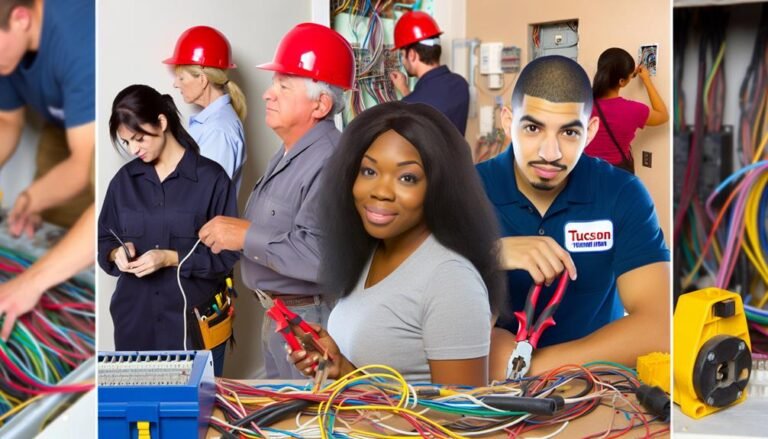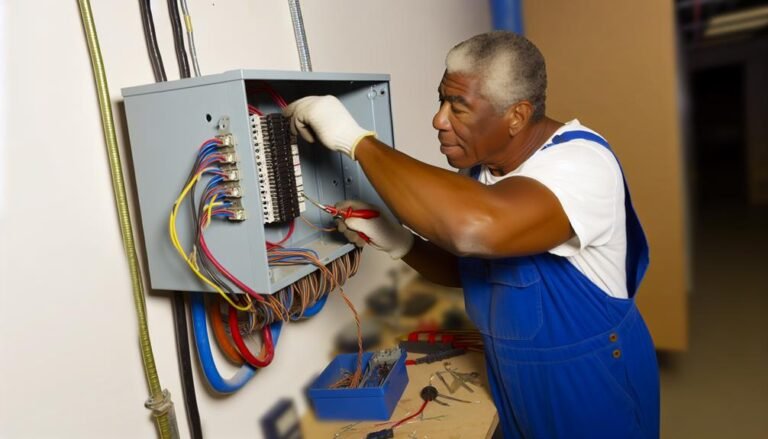So, you've decided to take on the electrifying task of rewiring your home in Tucson. Congratulations! It's like solving a complex puzzle, only this puzzle can zap you if you're not careful. But fear not, for this efficient home wiring guide is here to shed some light on the subject and help you navigate through the maze of wires and circuits.
Whether you're a seasoned DIYer or just starting out, this guide will equip you with the knowledge and skills to ensure a safe and efficient wiring project. But before we dive into the nitty-gritty details, let's start with the basics and explore why efficient home wiring is crucial for Tucson residents.
Key Takeaways
- Efficient home wiring ensures safe and reliable electricity distribution.
- Energy efficient wiring reduces energy waste and lowers utility bills.
- Proper insulation and sealing prevent energy loss.
- Following electrical code requirements ensures safe circuit installation.
Importance of Efficient Home Wiring
Efficient home wiring is crucial for ensuring safe and reliable electricity distribution throughout your Tucson residence. By adopting energy efficient wiring practices, you can enjoy several benefits while reducing electricity consumption.
Firstly, energy efficient wiring reduces energy waste, leading to lower utility bills. By minimizing energy loss, you can optimize the distribution of electricity, resulting in lower overall energy consumption. This not only saves you money but also contributes to a greener environment.
To achieve energy efficiency, consider the following tips for reducing electricity consumption in your home.
First, install LED light bulbs, which are more energy efficient than traditional incandescent bulbs. They consume less electricity, have a longer lifespan, and emit less heat. Additionally, consider using smart power strips that can automatically cut off power to devices in standby mode. This prevents unnecessary energy consumption when devices aren't in use.
Another tip is to properly insulate your home. Good insulation helps maintain a consistent temperature, reducing the need for excessive heating or cooling. Additionally, seal any gaps or cracks around doors and windows to prevent air leaks, which can lead to energy loss.
Implementing these energy efficient wiring practices won't only save you money but also contribute to a more sustainable future. By reducing electricity consumption, you can enjoy the benefits of lower utility bills while minimizing your environmental footprint.
Choosing the Right Wiring Materials
Now that you understand the importance of energy-efficient home wiring, let's focus on selecting the appropriate wiring materials for your Tucson residence.
When it comes to wiring your home, it's crucial to choose the right materials to ensure safety and efficiency.
One important aspect to consider is wire insulation. Insulation is vital as it protects the wire from moisture, heat, and other external factors that could cause damage or pose a safety risk.
When selecting wire insulation, it's essential to comply with electrical codes. These codes set the standards for safe electrical installations and help prevent hazards such as electrical shocks and fires. Make sure to choose insulation that meets the requirements of the electrical codes in your area.
Additionally, consider the type of wiring materials suitable for your specific needs. Copper wiring is commonly used due to its excellent conductivity and durability. However, aluminum wiring can be a more cost-effective option.
It's important to consult with a professional electrician to determine the best wiring materials for your home, considering factors such as budget, safety, and efficiency.
Understanding Electrical Circuits
To comprehend electrical circuits thoroughly, you must understand the flow of electricity and the components that make up these systems. Electrical circuits are pathways that allow electricity to flow from a power source to various electrical devices and appliances in your home. Understanding how circuits work is essential for electrical troubleshooting and ensuring that your home wiring meets electrical code requirements.
Electrical circuits consist of three main components: a power source, conductors, and loads. The power source, typically the electrical panel, supplies the electricity to the circuit. Conductors, such as copper wires, carry the electricity from the power source to the loads. Loads are the devices and appliances that consume the electricity, such as lights, outlets, and appliances.
When troubleshooting electrical issues, it's crucial to have a basic understanding of how circuits are structured and connected. You need to identify the source of the problem, which can be a faulty connection, a damaged wire, or an overloaded circuit. By following electrical code requirements, you can ensure that your home's circuits are properly installed and safe to use.
Key Considerations for Home Installations
Before proceeding with any home installations, it is imperative to carefully consider certain key factors to ensure the safety and efficiency of your electrical circuits. By implementing the right home wiring techniques and energy-saving strategies, you can create a secure and efficient electrical system for your Tucson residence.
To help you make informed decisions, let's explore some key considerations for home installations:
| Key Consideration | Description | Importance |
|---|---|---|
| Electrical Load | Determine the electrical load required for each circuit to prevent overload and fire hazards | Proper load distribution ensures optimal performance and prevents damage to appliances and electrical systems |
| Circuit Breaker Sizing | Select appropriately sized circuit breakers to protect your circuits from overcurrent | Right-sized breakers prevent tripping and minimize the risk of electrical fires |
| Grounding and Bonding | Ensure proper grounding and bonding of electrical systems to eliminate electrical shocks | Proper grounding protects you and your family from electric shocks and safeguards your appliances |
| Energy-Efficient Lighting | Use LED or CFL bulbs and dimmers to reduce energy consumption and save on electricity bills | Energy-efficient lighting options help conserve energy and reduce your carbon footprint |
Safety Measures for DIY Wiring Projects
When undertaking DIY wiring projects, it's crucial to prioritize safety by following proper procedures and guidelines. Electrical work can be dangerous if not done correctly, so it's important to take the necessary precautions to protect yourself and your home.
Here are three key safety measures to consider when embarking on a DIY wiring project:
- Safety Precautions:
- Always turn off the power before starting any electrical work. This can be done by switching off the circuit breaker or removing the fuse. Use a voltage tester to ensure that the power is truly off.
- Wear appropriate personal protective equipment (PPE) such as insulated gloves, safety glasses, and non-conductive footwear. This will protect you from potential electrical shocks.
- Avoid working on electrical systems in wet or damp conditions. Moisture increases the risk of electric shock.
- Necessary Tools and Equipment:
- Use high-quality tools specifically designed for electrical work. These may include wire strippers, pliers, voltage testers, and electrical tape. Having the right tools will make the job easier and safer.
- Insulate and protect exposed wires with electrical tape or wire nuts. This prevents accidental contact with live wires and reduces the risk of electrical fires.
- Use a circuit breaker finder or a non-contact voltage detector to identify live wires and determine if power is present.

